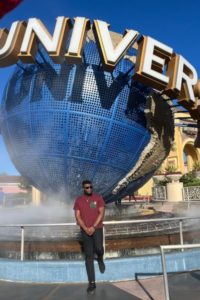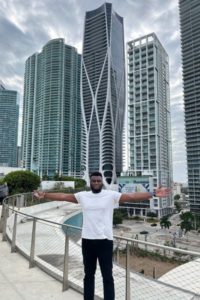
I am a fourth-year graduate student in the Bell-Pedersen lab. I am from the Niger-Delta region in southern Nigeria famous for its abundance of crude oil. I got my undergraduate degree in Microbiology from Obafemi Awolowo University in Ile-Ife, Nigeria, where I conducted research on isolating and characterizing crude oil degrading bacteria from soil samples from old auto mechanics workshops. I am currently studying the circadian clock at Texas A&M University, under the supervision of Dr. Deborah Bell-Pedersen. My future goal is to incorporate the knowledge of circadian clocks into biotech and pharmaceutical industrial processes. In my free time, I enjoy playing basketball, watching sports and movies, and spending time with friends.

What is your project?
My research project is on understanding the mechanisms through which the circadian clock regulates rhythmic protein synthesis in the fungus Neurospora crassa
What is the broader significance of your research?
In simple terms, the circadian clock is an internal clock that helps organisms anticipate and prepare for daily changes in the environment. The circadian clock has a major impact on human physical and mental health. Circadian clock disruption has been implicated in cancer, heart diseases, metabolic syndrome, neurodegenerative disorders, depression, and many other diseases that currently plague human health. So, a full understanding of the circadian clock and its mechanism would give us a better understanding of these diseases and would help develop new therapies to combat them. Also, a lot of drugs target proteins that are clock-controlled, so knowing when these proteins peak and trough in the body would inform the best time of day to administer these drugs to improve their efficacy and reduce their toxicity. Shift workers make up more than 20% of the workforce, and shift workers have a significantly higher risk of getting circadian disorders because they are constantly going against their circadian clock. Understanding the circadian clock would help us protect shift workers from the negative effects of going against their clock and help us inform daily behavioral practices that can protect the general populace from circadian disorders. My research will help us understand a core mechanism through which the circadian clock regulates protein synthesis, and this is an important step towards fully understanding not only how the clock works, but also how translation is regulated.

What is on your bookshelf?
A lot of fantasy classics for sure: Harry Potter, Percy Jackson, Artemis Fowl, The Lord of the Rings, The Hunger Games, The Mortal Instruments and A Song of Ice and Fire are notable mentions. A lot of Dan Brown and Mario Puzo works too, and more recently, Joe Abercrombie.

What is your favorite word?
My favorite word right now is probably ‘tintinnabulation’. To be honest I have no fancy reason why, I just think it is a very funny and completely unnecessary word.
What characteristics do you prize most in a colleague?
Two main characteristics for me are responsibility and good communication. The working environment is much more pleasant and comfortable if everyone takes responsibility for their work and duties, and there is clear communication. Respect is also very important. Respect everyone and everyone’s space, and everything else builds off that in a positive way.

What advice would you give to a new graduate student?
The most important thing would be to find a good lab for you. In my opinion, finding a lab and a principal investigator (PI) that you’re comfortable with is more important than the research project or model organism in that lab. Find a lab where you can learn a lot, and a PI whose mentorship style suits you. Remember you are going to spend the next 5 or so years in that lab, that is a long time to be in a space where you are not comfortable or happy.
Next advice would be to socialize with your fellow graduate students and other PIs. Learn a lot from other graduate students and PIs outside your lab, this helps you expand your knowledge of science and scientific techniques and tools, and it also helps you start building a network in the scientific community.
My final advice is that everyone makes mistakes, so do not be scared to make mistakes or fail. You will make mistakes, own up to them and learn from them, you are here to learn after all.

Why did you choose to focus on your specialty?
What drew me to circadian biology is the huge impact it has on almost all aspects of our life and health, and the fact that there is still so much we do not know about the circadian clock. A full understanding of the circadian clock and its mechanisms could fully transform life, health, and medicine as we know it and to me that was cool. As scientists, we all want to make an impact and so this field was impossible for me to ignore.
Give us 5 adjectives that describe you as a scientist.
Analytical, patient, critical-thinking, responsible and brilliant

What advancements do you see on the horizon in your discipline?
I think the field is already starting to move in the direction that all circadian biologists envisaged it will, and that is the actual translation of all our research findings into improving human health practically. Circadian medicine and bright-light therapy are already being employed and using circadian biology in time-of-day drug administration is also starting to gain some traction. Jetlag will soon become a thing of the past and upcoming sports, exercise and medical advancements will be rooted in circadian biology. Ultimately though, the potential advancements in the field are limitless.
